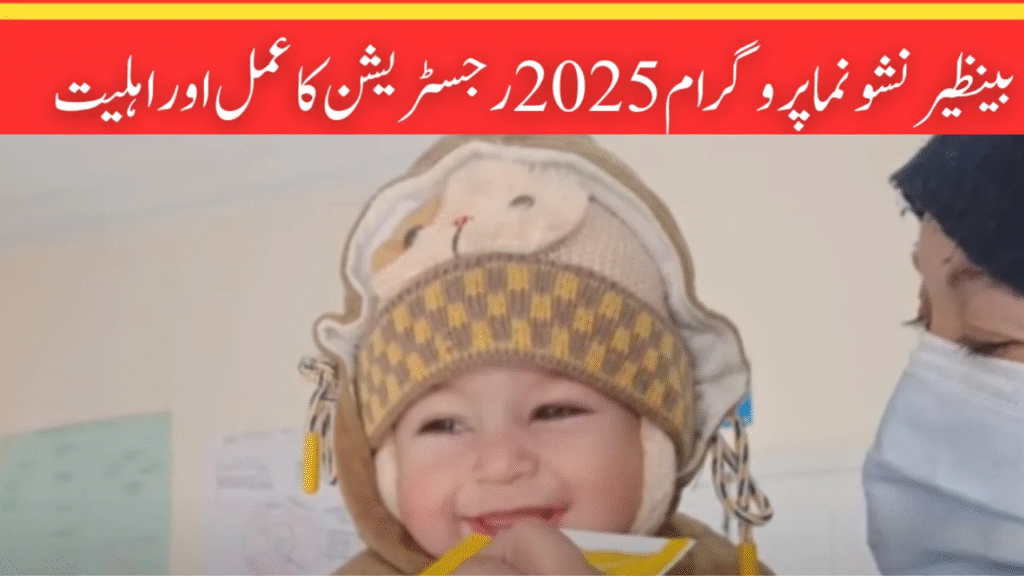Islamabad, January 2025 — The Government of Pakistan has officially streamlined the enrollment procedure for the Benazir Nashonuma Program (BNP) in 2025, aiming to improve maternal and child health outcomes by combating malnutrition in vulnerable communities.
The Benazir Nashonuma Program, launched under the umbrella of the Benazir Income Support Programme (BISP) in 2020, is a conditional cash transfer initiative designed to address stunting and malnutrition among children under two years of age, and support pregnant and lactating women (PLWs) across the country.
How to Enroll in the Benazir Nashonuma Program (2025)
As per the latest announcement by BISP officials, the 2025 enrollment process is open year-round at designated Nashonuma Centers, currently operating in over 160 districts through the support of the World Food Programme (WFP).
To be eligible, the applicant must:
- Be a registered beneficiary of BISP
- Be either:
- A pregnant or lactating woman, or
- The guardian of a child under 2 years of age
- Visit the nearest Nashonuma Center, often located within public health facilities or Tehsil Headquarters (THQs)
During enrollment, beneficiaries are required to:
- Present a valid CNIC and BISP registration proof
- Undergo a basic health screening
- Receive nutritional counseling and supplementation schedules
Once enrolled, beneficiaries receive a monthly stipend of Rs. 2,500 for a boy or Rs. 3,000 for a girl child, subject to compliance with health visits and immunization schedules.
Also Read: Benazir Income Support Programme Update for April 2025: Rs. 13,500 Payment Released!
Program Impact and Government Statements
According to official data from BISP, over 800,000 women and children were supported through the program by the end of 2024. With expanded outreach in 2025, the program aims to reach 1.2 million beneficiaries by mid-2026.
Speaking at a recent press briefing, BISP Secretary Yousaf Khan stated, “The Benazir Nashonuma Program is not just a financial intervention. It is a health and nutrition lifeline that ensures our future generations are not held back by preventable conditions like stunting.”
A field survey conducted by the Planning Commission of Pakistan in late 2024 reported a 15% improvement in child nutrition indicators among enrolled families, signaling the effectiveness of cash incentives paired with awareness sessions and regular checkups.
Expert and International Support
The program has garnered praise from global development partners. A representative from the World Food Programme, Ms. Alexandra Ruth, noted: “Pakistan’s multi-sectoral approach through Nashonuma sets a precedent for regional social protection programs aimed at women and children.”
Nutrition experts emphasize that early intervention during the first 1,000 days of a child’s life is critical to long-term health, cognitive development, and economic productivity.
Challenges and Future Outlook
While the program has made substantial progress, challenges remain in reaching remote districts and addressing cultural barriers that prevent women from accessing health services.
In response, BISP has begun piloting mobile health units and digital tracking systems in selected regions to increase enrollment and ensure compliance.
Public Awareness Drive
A new awareness campaign was also launched in December 2024 to educate beneficiaries about the updated enrollment process. Informational banners, radio messages, and community mobilization sessions are being carried out in collaboration with Lady Health Workers (LHWs) and local NGOs.
Background: What is the Benazir Nashonuma Program?
Initiated in August 2020, the Benazir Nashonuma Program is a flagship health-nutrition initiative under the BISP framework. It was developed in line with Pakistan’s commitment to the Sustainable Development Goals (SDGs), particularly SDG 2 (Zero Hunger) and SDG 3 (Good Health and Well-being).
The program’s design integrates:
- Cash support tied to health compliance
- Nutrition counseling
- Micronutrient supplementation
- Regular medical checkups and immunization tracking
Conclusion
With an improved enrollment process and increasing reach, the Benazir Nashonuma Program 2025 represents a vital step toward reducing Pakistan’s persistent malnutrition crisis. Continued collaboration between the government, health institutions, and international partners will be key in ensuring that every mother and child, regardless of income or location, has access to life-saving nutrition and care.
